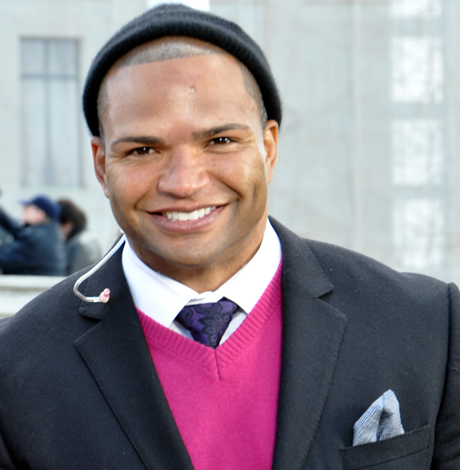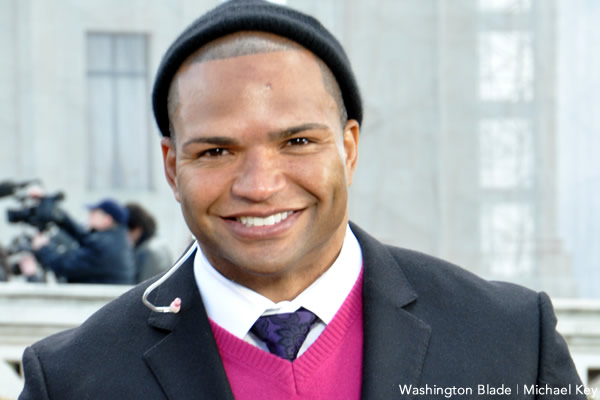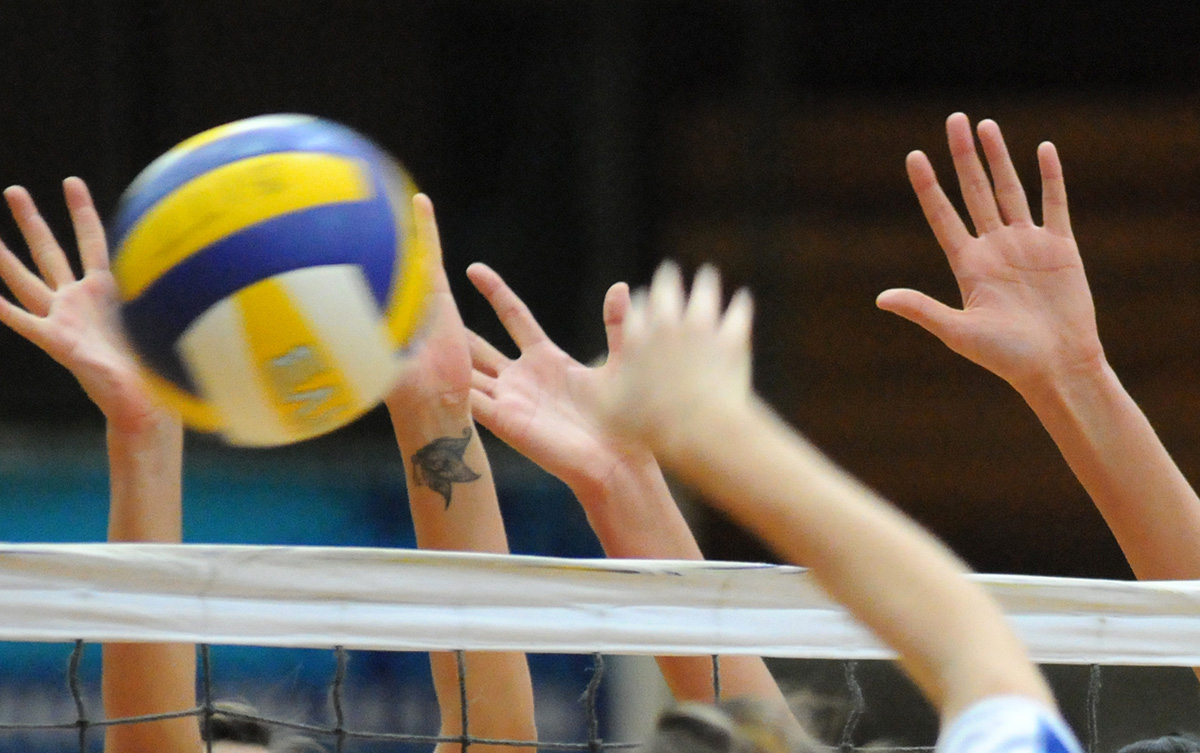Sports
Sports leagues lend a hand in fight for LGBT rights
Arizona, Indiana efforts boosted by NFL, NCAA


Former Ravens player Brendon Ayanbadejo is among high-profile pro athletes who’ve endorsed LGBT rights in recent years. He served as guest editor of the Blade Sports Issue two years ago. (Washington Blade photo by Michael Key)
As the LGBT community faces new challenges, including religious freedom measures seen to enable anti-LGBT discrimination, advocates have found a new ally in their fight: sports teams and related organizations.
In the past two years, professional and collegiate sports organizations helped derail measures that would have undermined LGBT rights in Arizona and Indiana. By speaking out, their statements aided efforts to combat the proposals.
Sarah Kate Ellis, president of GLAAD, said, “We’re seeing the sports landscape change” in terms of support for the LGBT movement.
“We’re seeing more and more professional leagues, and collegiate sports, actually take a stand for LGBT fans and players,” Ellis said.
In Arizona last year, the state legislature sent to Gov. Jan Brewer’s desk SB 1062, a controversial bill that would have enabled businesses and individuals to discriminate against LGBT people in the name of religious freedom.
Brewer vetoed the bill after a media firestorm and opposition from Republicans like Mitt Romney, Newt Gingrich, John McCain and Jeff Flake. Key opposition came from the National Football League, which at the time was planning to host Super Bowl XLIX in Scottsdale, Ariz.
As controversy over the measure intensified, the Arizona Super Bowl host committee issued a statement saying it disagreed with the bill and voiced concerns about its impact on America’s economy.
“On that matter we have heard loud and clear from our various stakeholders that adoption of this legislation would not only run contrary to that goal, but deal a significant blow to the state’s economic growth potential,” a committee spokesperson said. “We do not support this legislation.”
Catherine Alonzo, co-chair of Equality Arizona, said the contributions from the NFL and sports teams were “really important” in defeating SB 1062.
“It really was this diverse upsurge of people…who weren’t necessarily traditionally involved in the movement, but stood up and said, ‘This is wrong,'” Alonzo said. “The sports teams were part of this overwhelming diverse response.”
Alonzo said it’s “difficult to know” if Brewer would have vetoed the bill anyway without help from the Super Bowl organizers, but she maintained the support of the NFL “can’t be overstated.”
The situation repeated itself this year in Indiana with SB 101, except this time the firestorm didn’t emerge until after Indiana Gov. Mike Pence signed the measure into law. The controversy that later ensued prompted him to sign a fix clarifying the law won’t enable LGBT discrimination in the state in most situations.
Among the critics of the initial law was Mark Emmert, president of the National Collegiate Athletic Association, which is based in Indianapolis and was planning on hosting the Men’s Final Four basketball tournament in Indiana that year.
“We will work diligently to assure student-athletes competing in, and visitors attending, next week’s Men’s Final Four in Indianapolis are not impacted negatively by this bill,” Emmert said. “Moving forward, we intend to closely examine the implications of this bill and how it might affect future events as well as our workforce.”
Another critic of the Indiana measure was retired basketball star Charles Barkley, who called the law “unacceptable” and said officials should move the Final Four out of the state. Moving the tournament would have resulted in a loss of an estimated $70.8 million in revenue from Indiana.
David McFarland, founder of the Los Angeles-based United for Equality in Sports & Entertainment, said the events in Arizona and Indiana demonstrate the power of sports to influence people on LGBT rights.
“What we saw play out in Indiana and Arizona is how sport can act as a universal language and a common denominator that has the ability to break down walls and barriers to create social impact and change that can help violations against LGBT people,” McFarland said.
Before Arizona and Indiana, sports teams haven’t been overtly opposed to LGBT rights, but support from those organizations in fights against religious freedom measures stand out because they provided a crucial element of support when LGBT rights were in danger.
Other efforts on behalf of LGBT rights include NFL players Chris Kluwe and Brendon Ayanbadejo filing briefs in support of litigation against California’s Proposition 8 before the Supreme Court in 2013. The four major men’s sports leagues — the NFL, the MLB, the NHL and the NBA — have enacted sexual orientation non-discrimination protections for players and workers (although gender identity protections remain omitted from those polices). WNBA enacted a similar policy.
Five major sports leagues — the NFL, the MLB, the NHL, the NBA and the WNBA — are among the organizations that coordinate with GLAAD for Spirit Day, an annual event each on Oct. 15 that encourages individuals to wear purple to express opposition to anti-LGBT bullying.
McFarland said the atmosphere within the sports world, however, is another matter entirely for LGBT people.
“Even though America’s cultural, social and political climate is becoming increasingly accepting of LGBT Americans, competing and participation in sports is still considered to be an unsettling environment for many LGBT people,” McFarland said. “In fact, many Americans believe homophobia and transphobia are more common in sports than in the rest of society.”
But just as sports organizations have helped the general public become more accepting of LGBT rights, LGBT advocates have pushed the sports community.
One example is the public transition this year of Caitlyn Jenner, the transgender athlete and TV personality who won the Olympic decathlon title in 1976 and this year won the Arthur Ashe Courage Award at ESPN’s annual ESPY awards show.
Ellis, who was in attendance during the ceremony, said Jenner’s speech helped change the hearts and minds of audience members at the high-profile award show.
“It turned those people you could see were uncomfortable and might be leaning over talking to their seat mates and sort of giggling and whatever people do when they feel discomfort [and] silence them,” Ellis said. “And I thought that was a pretty profound momentum in sports for this year, for this decade.”
LGBT advocates also continue pressing for openly LGBT players in the major leagues to enhance LGBT visibility.
Robbie Rogers, a Major League Soccer player for LA Galaxy, is currently the only openly LGBT player for a major sports team in the United States. Jason Collins, who came out as gay in 2013, played for a year with the Brooklyn Nets, but then retired. Michael Sam was drafted into the NFL, but never saw time on the field.
Just this week, David Denson, a first baseman with the Milwaukee Brewers minor league affiliate in Helena, Mont., came out as gay, but no active player in Major League Baseball is openly gay.
McFarland said having more openly LGBT players would have “tremendous impact” on visibility for the LGBT community, but acknowledged sports organizations aren’t yet in that place.
“Unfortunately, for too many LGBT young people the built in safety nets of support, acceptance and caring do not exist fully in sport,” McFarland said.
Another opportunity for the sports world to support the LGBT community may come in Houston, where LGBT advocates are fighting to pass an LGBT-inclusive non-discrimination ordinance at the ballot in November and the NFL is planning to host Super Bowl LI in 2017.
Ellis said the NFL has a similar opportunity to speak out in favor of the Houston Equal Rights Ordinance just as it came out against the Arizona religious freedom measure.
“I’m hoping that we’ll see the NFL again take a stand like they did in Arizona and send a message that the Super Bowl doesn’t belong in a place where there’s anti-LGBT discrimination allowed,” Ellis said.
The NFL didn’t respond to a request for comment this week on whether it would support HERO as it prepares for Super Bowl LI.
Alonzo said the ability of a sports team to carry a message of LGBT inclusivity to an audience that might otherwise not hear it will be important for any effort for LGBT advocates going forward.
“This is a fight that we’re all in together, and this is something that we’re all affected by whether it is a part of your daily life or not,” Alonzo said. “Sports teams have been really important in bringing that message to their fans and will continue to be.”

FIFA has announced Saudi Arabia will host the 2034 World Cup, despite concerns over its human rights record that includes the death penalty for homosexuality.
The Associated Press reported FIFA confirmed the decision on Dec. 18. The AP noted Saudi Arabia is the only country that bid to host the 2034 World Cup.
“This is a historic moment for Saudi Arabia and a dream come true for all our 32 million people who simply love the game,” said Sport Minister Prince Abdulaziz bin Turki Al- Faisal, who is also president of the Saudi Olympic and Paralympic Committee, in a statement the Saudi Press Agency posted to its website.
Saudi Arabia is among the handful of countries in which consensual same-sex sexual relations remain punishable by death.
A U.S. intelligence report concluded Saudi Crown Prince Mohammed bin Salman “likely approved” the murder of Jamal Khashoggi, a Washington Post columnist, inside the Saudi Consulate in Istanbul in 2018. A federal judge in 2022 dismissed a lawsuit against Prince Mohammed after the Biden-Harris administration said he was immune to the lawsuit because he is the country’s prime minister.
Human rights activists have also criticized the Saudi government over the treatment of women, migrant workers, and other groups in the country.
“No one should be surprised by this,” Cyd Zeigler, Jr., co-founder of Outsports.com, an LGBTQ sports website, told the Washington Blade in an email after FIFA confirmed Saudi Arabia will host the 2034 World Cup. “FIFA, the International Olympic Committee, and many other world governing bodies routinely turn to authoritarian countries with terrible human-rights records to host major sporting events. There are simply few other countries willing to spend the billions of dollars it takes to build the needed infrastructure.”
Peter Tatchell, a long-time LGBTQ activist from the U.K. who is director of the Peter Tatchell Foundation, in a statement described FIFA’s decision as “a betrayal of the values that football should stand for: Inclusivity, fairness, and respect for human rights.”
“This is not about football; it’s about sportswashing,” said Tatchell. “The Saudi regime is using the World Cup to launder its international image and distract from its brutal abuses. By granting them this platform, FIFA is complicit in whitewashing their crimes.”
Qatar, which borders Saudi Arabia, hosted the 2022 World Cup.
Consensual same-sex sexual relations remain criminalized in Qatar.
“Saudi Arabia was the only country to bid for the 2034 FIFA World Cup,” said Zeigler. “So, until FIFA, the IOC (International Olympic Committee) and other governing bodies ban major human-rights violators from hosting, we’ll continue to see events like this in Saudi Arabia, China, Qatar, and other countries with terrible LGBTQ rights issues.”
The Blade has reached out to FIFA and the Saudi government for comment.
Sports
Controversy grows over member of Calif. university’s women’s volleyball team
Coach suspended, NCAA sued, more rivals forfeit

San Jose State University’s women volleyball team has collected yet another W by forfeit — its seventh so far this season — as controversy swirls around one player on its roster. She’s one of the seniors, and she has been dragged in the media by her own co-captain, who outed her as transgender.
The Washington Blade is not naming this student athlete since neither she nor the school have confirmed or even commented on her gender identity.
SJSU visited San Diego last weekend for a match before the Aztecs’ biggest home crowd of the season — including protesters waving “Save Women’s Sports” banners and booing one player on the Spartans team in particular: The woman who is reported to be trans.
Security was tight, with metal detectors and extra guards and police officers present. Video posted to YouTube by a right-wing sports media site — which names the player — shows an angry fan arguing with security about his First Amendment rights.
Video recorded during Nov. 9’s game shows a player for San Diego was injured following a spike by the player rumored to be trans, and had to be helped off the court. However, the video clearly shows that player was injured by landing poorly on one foot, not as a result of the spike.
The Aztecs defeated the Spartans 3-1, but San Jose has still punched its ticket to the conference finals, thanks to its record number of forfeits.
Wyoming was set to visit SJSU Thursday, but for the second time is joining other universities that have forfeited games against the Spartans, all without providing a reason. Boise State announced it will forfeit an upcoming match set for Nov. 21, its second forfeit against SJSU.
In September, the Spartans’ co-captain, senior Brooke Slusser, outed her own teammate, the player at the center of this controversy, in joining a federal lawsuit against the NCAA spearheaded by anti-trans inclusion activist and former college athlete Riley Gaines.
Slusser said in the lawsuit and in subsequent interviews that the player in question shouldn’t be on her team. The suit claims the NCAA’s policy on trans athletes violates Title IX by allowing “men” to compete in women’s sports and use women’s locker rooms where they display “full male genitalia.”
The NCAA policy for trans athletes participating in women’s volleyball aligns with that of USA Volleyball, which requires trans female athletes to suppress their testosterone below 10 nmol/L for a period of one year before competition. That is also how the NCAA determines eligibility. SJSU has stated repeatedly that all its players are eligible.
The lawsuit also asks the NCAA to revoke any titles or records won by trans female athletes in women’s competitions, which seems to be specifically aimed at stripping out trans NCAA champions Lia Thomas and CeCé Telfer of their titles in swimming and track and field, respectively.
Prior to this season, the player rumored to be trans did not attract any attention other than being a successful starter, like Slusser. But now that she is in the media spotlight, Slusser has come forward to tell right wing media, including Megyn Kelly, why she feels another woman two inches taller than she is poses a danger.
“I don’t feel safe,” Slusser said on “The Megyn Kelly Show” last month. “I’ve gone to my coaches and said I refuse to play against [her] … It’s not safe.”
In the video, both Kelly and Slusser refer to the player as “him” and a “man,” and name her.
Now comes another twist: San Jose State University suspended associate head coach Melissa Batie-Smoose with pay, indefinitely, after she filed a Title IX complaint against SJSU. She claims the player Slusser identified as trans conspired with an opponent to help the team lose a match and injure Slusser. Batie-Smoose named the player in question in her complaint and on Sept. 23, joined the same lawsuit that Slusser is now a part of.
“Safety is being taken away from women,” Batie-Smoose told Fox News. “Fair play is taken away from women. We need more and more people to do this and fight this fight because women’s sports, as we know it right now will be forever changed.”
Media reporting on the suspension, including Fox News, continue to name the athlete in question, with some also reporting what they say is the athlete’s birth name.
San Jose State released a statement following the suspension of Batie-Smoose: “The associate head coach of the San Jose State University women’s volleyball team is not with the team at this time, and we will not provide further information on this matter,” the team said.
SJSU Coach Todd Kress told ESPN that reports saying that any member of the Spartans colluded with their opponent are “littered with lies.”
The Spartans are currently among the top six finishers in the Mountain West Conference that will qualify to compete in the conference tournament scheduled for Nov. 27-30.
Sports
University of Nevada forfeits game rather than play possible trans athlete
Women’s volleyball team cites ‘not enough players to compete’

For the fifth time, a women’s volleyball team has chosen to forfeit instead of play against San Jose State University, because of rumors that one of its players is a transgender woman.
The University of Nevada, Reno, officially announced on Friday that it would forfeit Saturday’s game against the SJSU Spartans. This followed an announcement by Wolf Pack players who said they “refuse to participate in any match that advances injustice against female athletes,” without providing further details.
Originally, Nevada’s athletic department had said the program would not back out from the match, citing state equality laws, but also said that no players would be disciplined if they chose to not participate.
“The vast majority of our team decided this is something we wanted to take a stand on,” Nevada team captain Sia Liilii told Fox News. “We didn’t want to play against a male player.”
“In all of our team meetings it just kept coming back to the fact that men do not belong in women’s sports. If you’re born a biological male, you don’t belong in women’s sports. It’s not even about this individual athlete. It’s about fair competition and safety for everyone.”
Outsports and several conservative and right-wing websites have identified the player who is rumored to be trans, but the Washington Blade has opted to not do so since she herself has not come forward to either acknowledge or deny she is trans.
As ESPN reported, Nevada follows Southern Utah, Boise State, Wyoming, and Utah State in canceling games against the Spartans. Boise State, Wyoming, Utah State, and Nevada are all members of the Mountain West Conference, so those contests are considered forfeits and count as valuable wins in the league standings for San Jose State.
Riley Gaines, the anti-trans inclusion activist for the Independent Women’s Forum has joined the chorus in claiming the Spartans’ roster includes a trans woman.
If you're wondering why teams are forfeiting against @SJSU, here's the reason.
Last night another woman was smashed in the face by a kill from a man posing as a woman.
It's unfair, unsafe, and regressive, yet our "leaders" remain silent. pic.twitter.com/OS15AFxQsp
— Riley Gaines (@Riley_Gaines_) October 18, 2024
Despite this, neither San Jose State nor any of the other forfeiting teams have said the university’s women’s volleyball team has a trans player. SJSU issued a statement defending its roster.
“Our athletes all comply with NCAA and Mountain West Conference policies and they are eligible to play under the rules of those organizations. We will continue to take measures to prioritize the health and safety of our students while they pursue their earned opportunities to compete,” the statement read.
The governors of Idaho, Nevada, Utah, and Wyoming — all of whom are members of the Republican Party — have issued public statements supporting the cancellations, claiming it’s in the interest of fairness in women’s sports. This week, Donald Trump, the GOP presidential nominee and former president, spoke at a Fox News televised town hall when asked about trans athletes in women’s sports.
“We’re not going to let it happen,” Trump said. “We stop it, we stop it, we absolutely stop it. We can’t have it. You just ban it. The president bans it. You don’t let it happen. It’s not a big deal.”
-

 Obituary4 days ago
Obituary4 days agoLocal attorney, LGBTQ rights advocate Dale Sanders dies at 75
-

 U.S. Federal Courts3 days ago
U.S. Federal Courts3 days agoFederal judge blocks Trump passport executive order
-

 Mexico4 days ago
Mexico4 days agoGay couple claims Puerto Vallarta wedding venue discriminated against them
-

 Books3 days ago
Books3 days ago‘Pronoun Trouble’ reminds us that punctuation matters








